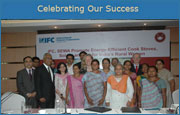 July 30, 2012 -- With support from IFC and partners, 'Hariyali', the green finance program of SEWA, a self-employed women workers' organization in India, is enabling the purchase of energy-efficient cook stoves and solar lanterns to support 200,000 rural women. As a result, low-income households are able to minimize expenses for firewood, kerosene, and electricity; reduce exposure to respiratory diseases from smoke inhalation; and improve lighting for children to study, while women can work on their embroidery and crafts at night.
July 30, 2012 -- With support from IFC and partners, 'Hariyali', the green finance program of SEWA, a self-employed women workers' organization in India, is enabling the purchase of energy-efficient cook stoves and solar lanterns to support 200,000 rural women. As a result, low-income households are able to minimize expenses for firewood, kerosene, and electricity; reduce exposure to respiratory diseases from smoke inhalation; and improve lighting for children to study, while women can work on their embroidery and crafts at night.
In addition to providing a partial risk guarantee for a loan by an Indian bank to SEWA-sponsored Grassroots Trading Network for Women, IFC is advising SEWA to build a loan product line, set up information systems and processes for managing loans, and train staff to serve low-income customers better. The project will potentially generate carbon credits, the benefits of which will help yield income for SEWA members.
Clean Energy, Better Health, Improved Livelihoods
“Our partnership with SEWA will address the energy, environmental, and health challenges faced by rural women and households,” said Karin Finkelston, IFC Vice President for Asia Pacific. “The new financial structure will help them purchase clean energy products." The project aims to create a replicable business model for South Asia and other parts of Asia and Africa.
The multi-purpose solar lantern provides 10 hours of light once charged in sunlight. A package comprising a cook stove and a lantern cost about $100, and the women are expected to pay back the amount in 16 monthly installments. IFC is also advising SEWA Bank to help it expand and transform from an urban cooperative bank to a pan-India bank that will use technology to offer customer-friendly financial products, while managing risks efficiently. Once implemented, SEWA Bank will be able to support women members purchasing the package.
"Firewood needed for the new cook stove is half of what we used in the traditional ones, so we need not spend all our time looking for firewood. Cooking time has halved too, so women farmers can spend more time at their farms. It frees up time that can now be spent in livelihood earning activities," says Shardaben, a SEWA 'Hariyali' team member. "There is no smoke in the house, so lesser health problems!"
Power of Persistence
The idea for such an environment-friendly initiative took off in 2010 at a global summit in Sweden, where discussions between IFC and SEWA centered on making solar lanterns, energy-efficient stoves, and other similar eco-friendly products affordable to rural communities.
Persistent follow-up between the two organizations helped the project teams realize the potential and added value of the project, which combines strategic priorities of innovation, inclusiveness, and clean growth, with creating opportunities for underserved communities in India.
IFC has been working closely with SEWA for the past six years.